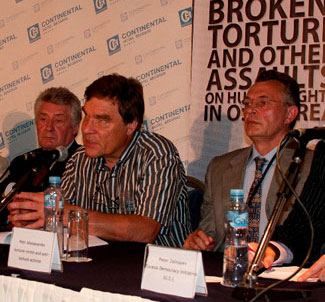 |
On
July 6-9, parliamentarians from OSCE member states gathered together
for the annual conference of its Parliamentary Assembly, which was
held in Belgrade. Among several agenda items, some of them strictly
dealing with the usual OSCE bureaucratic protocol, the human rights
situation in countries of the former Soviet Union was featured
prominently. Uta Zapf, OSCE PA's Rapporteur on Belarus held a
special briefing on the post-election crackdown in that country,
where she invited Belarusian and Russian civil society activists.
Kimmo Kiljunen, OSCE PA's Representative on
Central Asia, addressed the plenary session and later spoke at an
NGO briefing about the results of the work the International
Independent Commission for Inquiry into the interethnic violence
which took place in southern Kyrgyzstan in June 2010. Joining him at
the briefing were NGOs and an anti-torture activist who urged
eradication of torture in the OSCE area. |
This was Kiljunen's farewell appearance at the Assembly both as
Chair of the Commission, which just finished its work, and as a
member of the Finnish delegation, following his loss in Finland's
last parliamentary elections. Kiljunen prefaced his speech at the
plenary by acknowledging the great emotional toll that his work as
chair of the Commission took on him. He proceeded to express his
doubts regarding the Kyrgyz government's political will to deal with
the aftermath of the tragedy in a balanced and fair way. As he
noted, the overwhelming majority of destroyed homes and of
casualties during the June 2010 events were ethnic Uzbeks. Ethnic
Uzbeks continue to be underrepresented in Kyrgyzstan's government.
For as long as the Kyrgyz government continues to resist calls for a
credible effort of interethnic reconciliation, the future of
Kyrgyzstan will remain bleak, was Kiljunen's pessimistic prognosis.
As soon as the diplomat finished his speech, the Kyrgyz delegation
went on offensive, challenging the credibility of the Commission and
the validity of its findings. The delegation's head, Kanatbek Isaev,
characterized the commission's report as "subjective," going as far
as to accuse its members of having a "pro-Uzbek" bias. A female
member of the delegation became so emotional during her retort that
she appeared to be screaming by the time she finished. Among her
complaints: the suggestion proposed by outside experts to change the
name of the country from the "Kyrgyz Republic" to "Republic of
Kyrgyzstan," in order to better reflect the country's multi-ethnic
character.
Among several speakers who took the floor
following the emotional outburst by the Kyrgyz delegation was Viola
von Cramon-Taubadel, a member of the Green Party from the German
delegation, who defended the Commission and its report and urged the
Kyrgyz side to abide by its international commitments in protecting
its ethnic minorities from discrimination.
Ethnic discrimination, torture and other assaults
on human rights in the OSCE area was the subject of a special NGO
briefing which took place on the second day of the conference. The
briefing was organized by a prominent local human rights group, the
Helsinki Committee for Human Rights in Serbia. Joining Kimmo
Kiljunen were Tony Lloyd, chairman of the Labor faction of the
British Parliament and long-standing critic of the use of torture
and other illegal interrogation techniques in the global war on
terror; Judita Popovic, Vice President of the Serbian Parliament;
Vitaly Ponomarev, Memorial Human Rights Center; and Petr
Afanassenko, a torture victim and anti-torture activist who worked
as a bodyguard for former Kazakh Prime Minister Akezhan Kazhegeldin.
Originally from Kazakhstan and currently residing in Belgium,
Afanassenko shared with the audience his personal story of enduring
torture at the hands of the former high-level Kazakhstani official
and former member of the Kazakh President's family, Rakhat Aliyev.
Echoing Tony Lloyd's appeal for countries to abide by the principle
of inadmissibility of evidence obtained under torture, Afanassenko
told the audience about Mr. Aliyev's efforts to discredit
Kazhegeldin by forcing him to sign a self-incriminating confession
under the influence of psychotropic drugs and various kinds of
physical and psychological duress. Having filed a civil lawsuit
against Aliyev in a Vienna court, Afanassenko claims to represent a
group effort by individuals who were victims of Aliyev's. Apart from
his personal goal of obtaining damages for the loss of his career
and health, Afanassenko hopes to send the following message to
Aliyev and other torturers: "There is no place for you in democratic
Europe." Together with other human rights activists at the
conference, Afanassenko delivered a letter addressed to the head of
the delegation of Austria to the OSCE PA, Barbara Prammer, urging
the Austrian government to order a thorough investigation into the
criminal charges against Aliyev. A recent article in the leading
Viennese newspaper, Wiener Zeitung, quoted members of the European
Parliament expressing dismay with Austria's failure to take action
regarding the grave charges against Mr. Aliyev, including his
alleged responsibility for the murder of two bank employees whose
bodies have recently been found, after missing for several years.
Participants in the briefing noted the irony of
legitimate refugees from Central Asian countries facing obstacles in
obtaining asylum in EU countries, while human rights abusers like
Aliyev seem to be able to find safe haven using their unlimited
wealth and influence. Vitaly Ponomarev finished the briefing by
drawing attention to the plight of the 28 Muslim refugees who were
recently extradited from Kazakhstan to Uzbekistan. He urged the
repeal of the 1992 Minsk Convention signed by members of the CIS,
which contravenes the UN Committee against Torture and the
internationally recognized principle of non-refoulement. |
